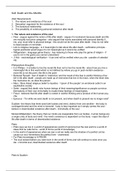Study guide
Philosophy - Self, Death & Afterlife
- Vak
- Instelling
AQA Religious Studies - Philosophy - Self, Death & Afterlife - Full in depth notes according to the specification, including quotes, key thinkers and everything you need to achieve an A*.
[Meer zien]




